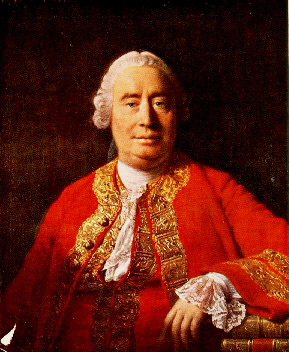The Implications of ’Ought’
5 maj 2011 | In academia Ethics Meta-ethics Moral philosophy Naturalism | Comments?(Dedicated to 300 year old David Hume, with whom one would have liked to chat, according to widespread scholarly opinion. I sort of think a contemporary version exist in the form of Simon Blackburn)

Normative/evaluative concepts are difficult to analyze all the way down. Attempts to do so tend to leave one with a normative ”residue”.”Value” is one such concept, one that I’ve spent the best part of my youth trying to get to grips with. ”Ought” is another, one that I’ve spent the best part of my youth neglecting. ”Reason”, of course, is the current darling of the moral theory set.
G E Moore, famously, took this difficult residue to as evidence for the fundamental irreducibility of value. Value is a simple notion, one which we grasp but don’t know how we grasp, and nothing more can be said about it. It’s notable (and noted) that this statement comes rather early in Moore’s Principia Ethica and that he then goes on to say quite a lot about value.(Wittgenstein at least had the decency to END his Tractatus with his similar, but more general, claim).
Clearly, as Moore realised, things can be said about simple notions, otherwise how could we distinguish between different simple notions? For instance, notions such as ’ought’ carry implications. This blogpost, which hasn’t quite started yet, is about the implications of ’ought’. Goodbye, Youth.
Here are a handful of suggestions/observations, three about the ”implications” of ’ought’, and one negative about the inferability of ’ought’
- ’Ought’ implies ’If’: the Hypothetical Imperative, an ”instrumental” ought. IF you want to get to the station in time, you OUGHT to take this short-cut. Some will say this is the ONLY sense of ’ought’ that makes sense. Even the moral ’ought’ carries conditionals of this sort.
- ’Ought’ implies ’can’: If you ought to do something, you can do it. What you ought to do is, for instance, the act that has the best possible consequences of all the acts that you can perform. These may not be very good, but what can you do? You can’t be blamed for not doing what you cannot do. The complications here regards the scope of the ”can”.
- ’Ought’ implies ’Would’: Not a strict implication, but this is an often used, but seldom recognised, method to backward engineer an inductive argument: If Utilitarianism is correct, we ought to put the fat man down on to the tracks to stop the runaway trolley. But I/you/most people wouldn’t. Thus, Utilitarianism cannot be correct. Utilitarians can, and do, reply that what you would do does not imply anything about what you should do, but still: this is awkward, and in need of explanation. If your moral theory implies that you should do something that you are reluctant to do, the theory suffers. It’s basically a sort of reductio argument, but with the ”absurd” replaced by the ”icky”. And then there is my pet peeve:
- You CANNOT infer an ’ought’ from an ’is’. Try as you might, the self-styled Humean blurts out, gather all the evidence you can, as long as you have only descriptions, you cannot infer what we ought to do. My main objection against this line of argument is that it is LAZY. People, professional philosophers not excluded, use this argument in order to save themselves from additional work – the find the normative claim, fail to identify any normative premiss, and then they don’t bother with the rest of the reading. Hume was right, you cannot infer an ’ought’ from an ’is’, at least not until you know what ’ought’ means, how it is circumscribed by other normatively charged terms, and, in turn, what they mean and, possibly, refer to.